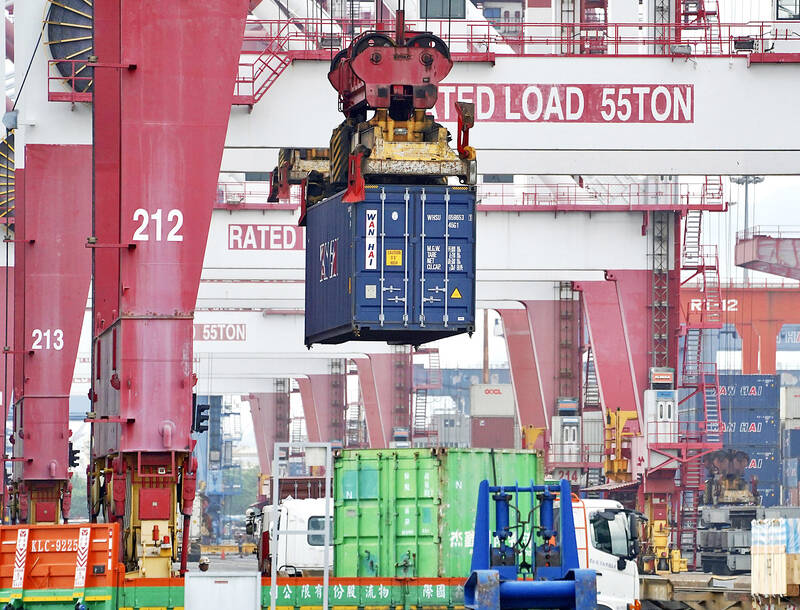Exports last month gained 3.4 percent to US$38.81 billion, ending 12 straight months of decline, thanks to strong demand for technology products related to artificial intelligence (AI), the Ministry of Finance said yesterday.
The release of new-generation consumer electronic products, notably smartphones, and a low comparison base from the same period last year helped boost exports, Department of Statistics Director-General Beatrice Tsai (蔡美娜) said.
“It is safe to say that exports are coming out of the woods” following a year of inventory adjustments, Tsai told a news briefing.

Photo: CNA
The crucial economic bellwether might lead to no or a minor contraction this month, while helping to stage a healthy recovery in the coming months, she said.
Nevertheless, shipments of electronics, primarily chips, shrank 4.3 percent year-on-year, but should return to positive territory next month, she added.
An earnings conference next week by Taiwan Semiconductor Manufacturing Co (台積電) — which counts Apple Inc, Nvidia Corp, Intel Corp, Advanced Micro Devices and other technology giants among its customers — would shed more light on the state of the industry, Tsai said.
Shipments of information and communication technology (ICT) products surged 59.8 percent to a record US$8.26 billion, underpinning the turnaround in exports and making up 17 percent of overall exports, she said.
Demand for AI-related products accounted for double-digit percentage increases in shipments bound for the US and Europe, where technology firms are aggressively developing and building up AI equipment and solutions despite stubborn inflation, the ministry said.
Shipments to ASEAN markets soared 24.8 percent to US$7.48 billion, making the bloc Taiwan’s second-largest export destination, aided by robust demand for electronics and ICT products, Tsai said, adding that a global supply chain realignment also contributed to the rise.
Exports to China fell 8.8 percent, easing to a single-digit percentage for the first time in 14 months, a positive sign, she said.
Non-tech products also benefited, with exports of chemical and mineral products rising 10.3 percent and 0.9 percent respectively on the back of inventory restocking demand and higher international oil prices, she said.
By contrast, imports fell 12.2 percent to US$28.49 billion, as local firms refrained from buying semiconductor equipment and raw materials used for exports, she said.
That gave Taiwan a trade surplus of US$10.32 billion, more than twice what it was a year earlier, the ministry said.
For the third quarter, exports fell 5.1 percent to US$114.9 billion, while imports dropped 19 percent to US$87.49 billion, beating the government’s forecast in August.
Exports fell 13.8 percent to US$316.98 billion in the first nine months of this year, while imports dropped 19.7 percent to US$263.12 billion, worse than other trade rivals such as South Korea, Japan, Singapore and China.
High comparison bases in the past few years due to the trade effects of COVID-19 accounted for Taiwan’s poor showings and highlight its vulnerability to global technology downcycles, Tsai said.

DEFENDING DEMOCRACY: Taiwan shares the same values as those that fought in WWII, and nations must unite to halt the expansion of a new authoritarian bloc, Lai said The government yesterday held a commemoration ceremony for Victory in Europe (V-E) Day, joining the rest of the world for the first time to mark the anniversary of the end of World War II in Europe. Taiwan honoring V-E Day signifies “our growing connections with the international community,” President William Lai (賴清德) said at a reception in Taipei on the 80th anniversary of V-E Day. One of the major lessons of World War II is that “authoritarianism and aggression lead only to slaughter, tragedy and greater inequality,” Lai said. Even more importantly, the war also taught people that “those who cherish peace cannot

STEADFAST FRIEND: The bills encourage increased Taiwan-US engagement and address China’s distortion of UN Resolution 2758 to isolate Taiwan internationally The Presidential Office yesterday thanked the US House of Representatives for unanimously passing two Taiwan-related bills highlighting its solid support for Taiwan’s democracy and global participation, and for deepening bilateral relations. One of the bills, the Taiwan Assurance Implementation Act, requires the US Department of State to periodically review its guidelines for engagement with Taiwan, and report to the US Congress on the guidelines and plans to lift self-imposed limitations on US-Taiwan engagement. The other bill is the Taiwan International Solidarity Act, which clarifies that UN Resolution 2758 does not address the issue of the representation of Taiwan or its people in

US Indo-Pacific Commander Admiral Samuel Paparo on Friday expressed concern over the rate at which China is diversifying its military exercises, the Financial Times (FT) reported on Saturday. “The rates of change on the depth and breadth of their exercises is the one non-linear effect that I’ve seen in the last year that wakes me up at night or keeps me up at night,” Paparo was quoted by FT as saying while attending the annual Sedona Forum at the McCain Institute in Arizona. Paparo also expressed concern over the speed with which China was expanding its military. While the US

‘FALLACY’: Xi’s assertions that Taiwan was given to the PRC after WWII confused right and wrong, and were contrary to the facts, the Ministry of Foreign Affairs said The Ministry of Foreign Affairs yesterday called Chinese President Xi Jinping’s (習近平) claim that China historically has sovereignty over Taiwan “deceptive” and “contrary to the facts.” In an article published on Wednesday in the Russian state-run Rossiyskaya Gazeta, Xi said that this year not only marks 80 years since the end of World War II and the founding of the UN, but also “Taiwan’s restoration to China.” “A series of instruments with legal effect under international law, including the Cairo Declaration and the Potsdam Declaration have affirmed China’s sovereignty over Taiwan,” Xi wrote. “The historical and legal fact” of these documents, as well